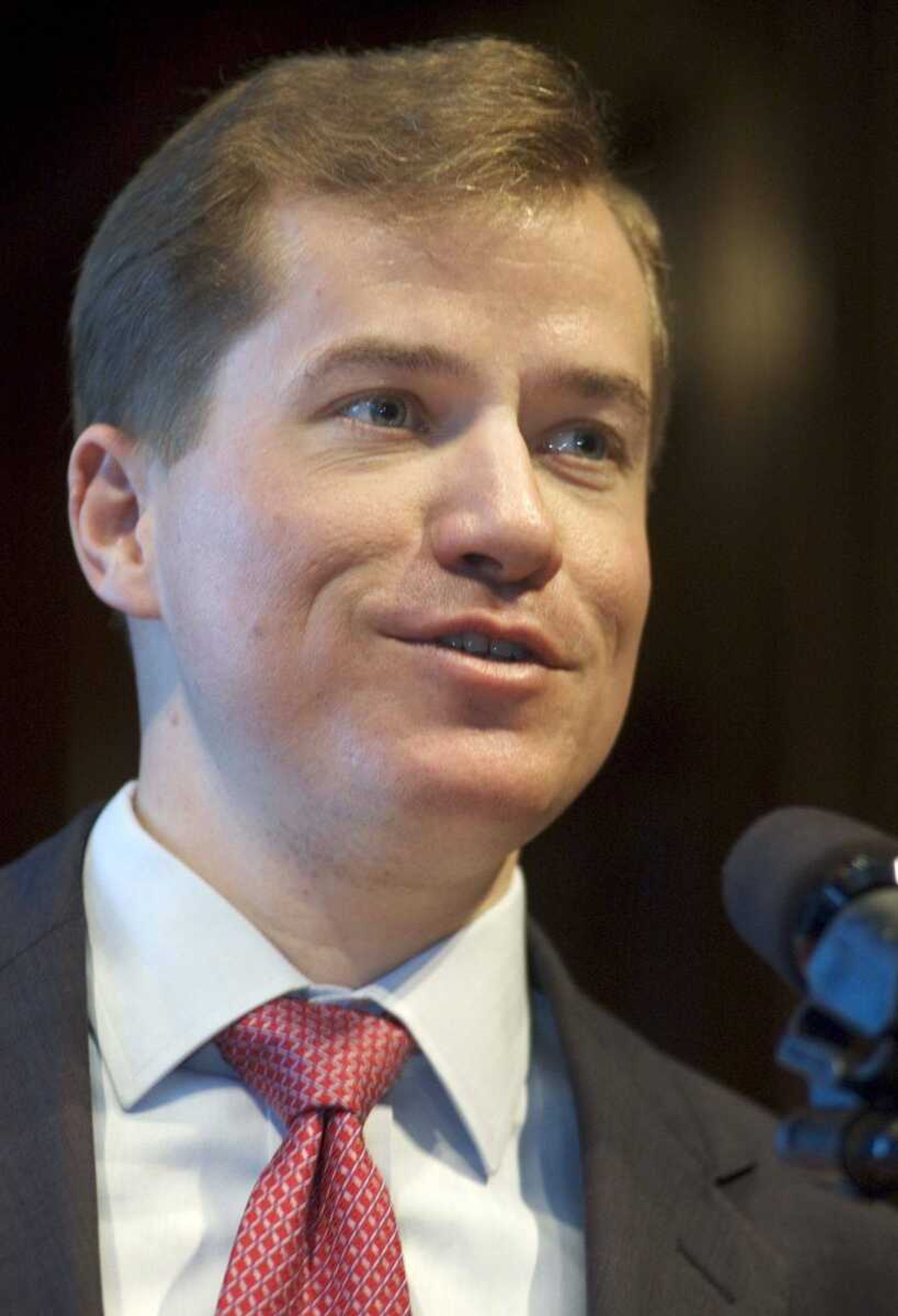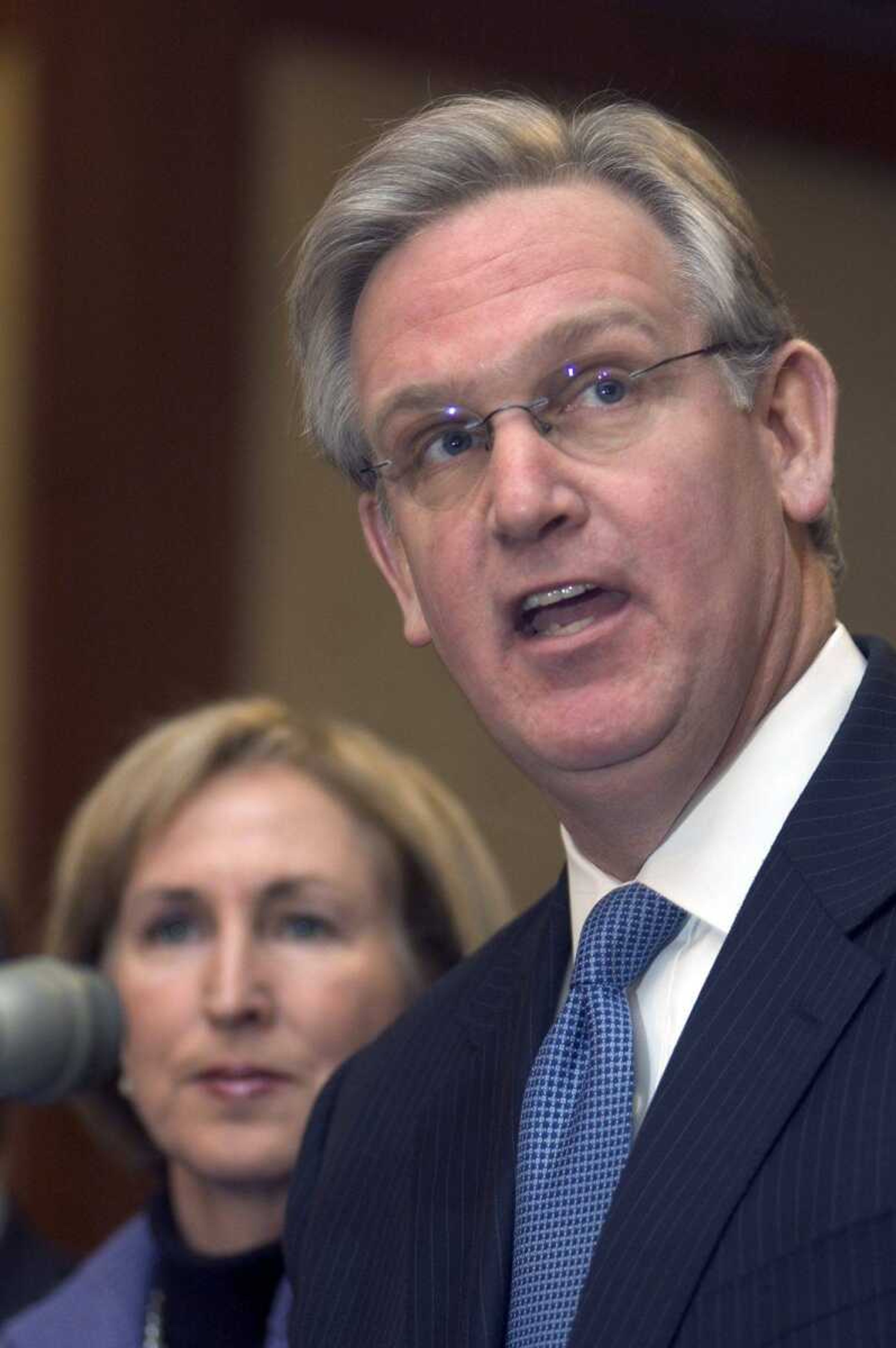To win, Nixon now must take a page from Blunt's campaign
JEFFERSON CITY, Mo. -- Democratic Attorney General Jay Nixon has been campaigning for years against Republican Gov. Matt Blunt. To win, Nixon now must campaign just like Blunt -- as someone calling for change from the failed policies of a governor no longer on the ballot...
JEFFERSON CITY, Mo. -- Democratic Attorney General Jay Nixon has been campaigning for years against Republican Gov. Matt Blunt. To win, Nixon now must campaign just like Blunt -- as someone calling for change from the failed policies of a governor no longer on the ballot.
Blunt's sudden and unexpected exit from the 2008 gubernatorial race has reshuffled the roles of Missouri's politicians in a reprise of the 2004 election. As a result, Nixon has been handed both a fresh opportunity and a new challenge.
Four years ago, then-secretary of state Matt Blunt built his gubernatorial campaign around a call for change from what he portrayed as the failed policies of Democratic Gov. Bob Holden. The incumbent was unpopular, in part, because of budget cuts and a slumping national economy.
Then Holden lost in the Democratic primary, and Blunt was forced to refocus his message to run against Claire McCaskill. His antagonist no longer his opponent, Blunt had to campaign more generally with a call for change from Democratic failures.
Blunt adjusted and won.
Now Blunt finds himself in the uncomfortable position of Holden -- unpopular, partly because of budget cuts, with the national economy again turning downward.

Blunt announced Tuesday that he will not seek re-election this year, asserting he had accomplished virtually all of his goals, no longer had "that same sense of mission" and wanted to spend more time with his wife and child.
Nixon now finds himself in a similar position as Blunt did four years ago. His antagonist no longer his opponent, Nixon quickly adjusted Wednesday by substituting the pronoun "they" for "he" to describe what he now casts as a general failure by the Republicans in charge of Missouri's Capitol.
No longer will Nixon be campaigning against Blunt's health-care cuts, when several hundred thousand Missourians had their Medicaid benefits eliminated or reduced in 2005 as a means to balance the state budget. Now Nixon will be campaigning against the Republicans' Medicaid cuts.
Asked Wednesday about Blunt's claim of accomplishments, Nixon broadened his response beyond Blunt to all Republicans.
"They got rid of health care for 400,000 people.
"They made health care, for people that do have health care, be more expensive.
"They made the uninsurance rate -- of people that don't have insurance in this state -- go up to over 750,000 people with no health care.
"They said 127,000 kids shouldn't have health care in this state," said Nixon, repeatedly using the plural pronoun.
But without Blunt on the ticket, Nixon could face a new Republican candidate who never enacted nor voted for the Medicaid cuts.
Nixon is "not going to be able to use very effectively the governor's Medicaid cuts against one of these other opponents," said political scientist Dave Robertson, of the University of Missouri-St. Louis.
But Nixon indicated he will continue to campaign on Blunt's Medicaid cuts.
"The issues haven't changed," Nixon said. "Just because the governor has decided not to run doesn't mean that 400,00 people who had their health care cut have had it restored."
If elected, Nixon is pledging to reverse those cuts as one of his first actions.
Similarly, candidate Blunt continued to campaign in 2004 against Holden's budget cuts to education, specifically criticizing Holden's decision to withhold nearly $200 million from public schools as a means to keep the budget balanced.
As a candidate, Blunt pledged never to withhold money from public schools and always to provide them more money than they received the previous year. As governor, he remained true to that pledge, which perhaps enhanced his need to cut other parts of the budget.
Seizing on the lessons learned by both Blunt and Holden, Nixon is trumpeting the need to expand aid to both health care and education.
Blunt's exit from the governor's race also could give Nixon another edge enjoyed by Blunt in 2004 -- money and unity.
While Democrats spent their money in a contentious gubernatorial primary, Blunt was able to amass cash for the general election because he faced no formidable Republican opponents. Now it is Nixon lacking opponents and amassing cash while Republicans brace for the potential of an expensive, multicandidate primary.
It all worked out well for Blunt in 2004.
Nixon's hoping for a repeat.
Connect with the Southeast Missourian Newsroom:
For corrections to this story or other insights for the editor, click here. To submit a letter to the editor, click here. To learn about the Southeast Missourian’s AI Policy, click here.









